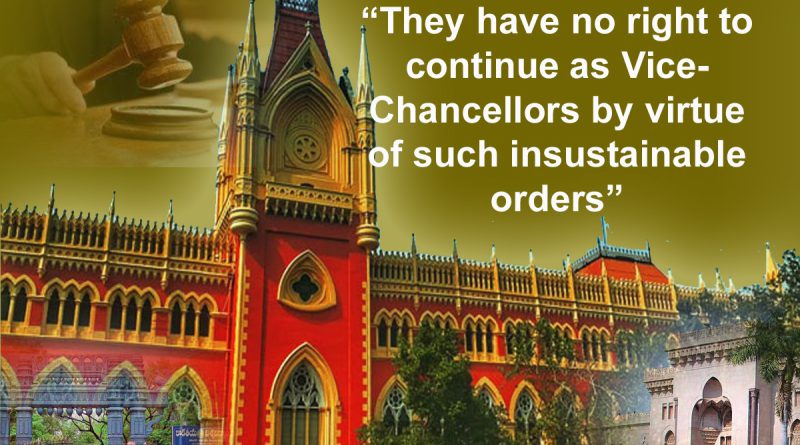States violating UGC norms in appointment of Vice chancellor s.
The fate of VCs of Telangana universities is questionable with the judgment of West Bengal High Court As West Bengal High Court’s decision leaves Telangana VCs uncertain, questions arise on sta te government’s control over universities. The appointm ent process and the politic ization of positions have sparked concerns, leading to a call for qualified VCs and a change in attitude towards university development. Will this mark the beginning of a common man’s revolt against political interference in higher education? Last year, a public interest litigation was filed in the Calcutta High Court challenging the appointment of vicechancellors of various universities in the state of West Bengal. The litigation, which included the state government as respondents, alleged that the appointments were made in violation of UGC-2010 and 2018 regulations. After a year of arguments, Calcutta High Court Chief Justice Prakash Srivastava and Justice Rajarshi dismissed 29 vice-chancellors in contravention of UGC norms, lacking minimum qualifications, in a 46-page judgment by the Bharad waj-led bench Following the invalidation of the appointment of the vice chancellors of Sardar Patel University in Gujarat by the Supreme Court, the appointment of vice-chancellors for 10 universities in Telangana is also likely to be questioned. State university associations have stated that the high courts of several states may also be cited. While the Supreme Court criticized the appointment of the vice-chancellor of Sardar Patel University, who lacked 10 years of experience as a professor, a similar vice-chancellor was appointed for the second-largest university in Telangana. The judgment on the petition filed in the high court for the removal of the VC is still pending.
The appointment of unqualified individuals as vice-chancellors in West Bengal universities, and the lack of proper procedures in selecting candidates, has raised concerns among education experts. These appointments were made without the approval of the governor, in contravention of rules requiring a three-member search committee nominated by the state government, the governor, and the UGC. This has resulted in the appointment of 29 vice-chancellors who do not meet the minimum qualifications. Experts say that such appointments undermine the integrity of the education system, and are an insult to the state’s universities.
In other states, the appointment of vice-chancellors has also come into question, with some governments disregarding the approval of governors who act as chancellors. A recent judgment found fault with the appointment of the vice-chancellor of the University of Calcutta by the state government without the governor’s permission. Despite the vice-chancellor challenging the verdict in the Supreme Court, the appointment was eventually deemed invalid, and the state government was forced to remove the VC from the position.
The appointment of vice-chancellors in ten Telangana state universities has been called into question due to non-compliance with UGC norms, similar to the situation in West Bengal. Seven petitions were filed in the state high court last year seeking the removal of these VCs, including a case filed by retired Nizamabad principal Dr Vidyasagar Reddy, who argued that the appointment of the state’s second-largest university’s vice-chancellor was invalid due to insufficient experience as a professor. However, disappointment followed as the case was transferred to another judge for further arguments and a verdict. In March this year, retired Osmania University professor D Manohar Rao filed a case against the appointment of VCs in almost all universities in the state, naming 40 respondents. Professor S. Pradeep Kumar of Jawaharlal Nehru Fin arts University, Osmania University professor Dr. Karunakar Reddy, and the NSUI and Akhil Bharatiya Vidyarthi Parishad student bodies also filed cases against the appointments of various VCs. The cases are scheduled for another hearing on the 21st of this month, and following the recent West Bengal High Court verdict, there will likely be further discussion on the appointment of VCs in Telangana state universities.
According to the intellectual class, the recent cases of illegal appointments of Vice-Chancellors (VCs) in various universities in Telangana reveal a political conspiracy to undermine the universities. The academic community is eager for the illegal appointments to come to an end, as these VCs are creating issues in the universities they lead. The government is also facing criticism for filing police cases against protesting students and creating an environment of fear, which is preventing the resolution of issues in the universities. Both student and employee unions have expressed concern that the government is not taking any action to address the widespread illegal appointments of VCs in universities across the state, even though these appointments are causing many irregularities and disruptions. In the past, some universities, such as Kakatiya University, have faced fake certificate scams due to such irregularities.
To ensure the smooth functioning of the universities, the student and employee unions are calling for the appointment of VCs to be free of political interference. Additionally, the appointment of VCs that are currently under scrutiny in court should be protected from further irregularities until the completion of their terms.

